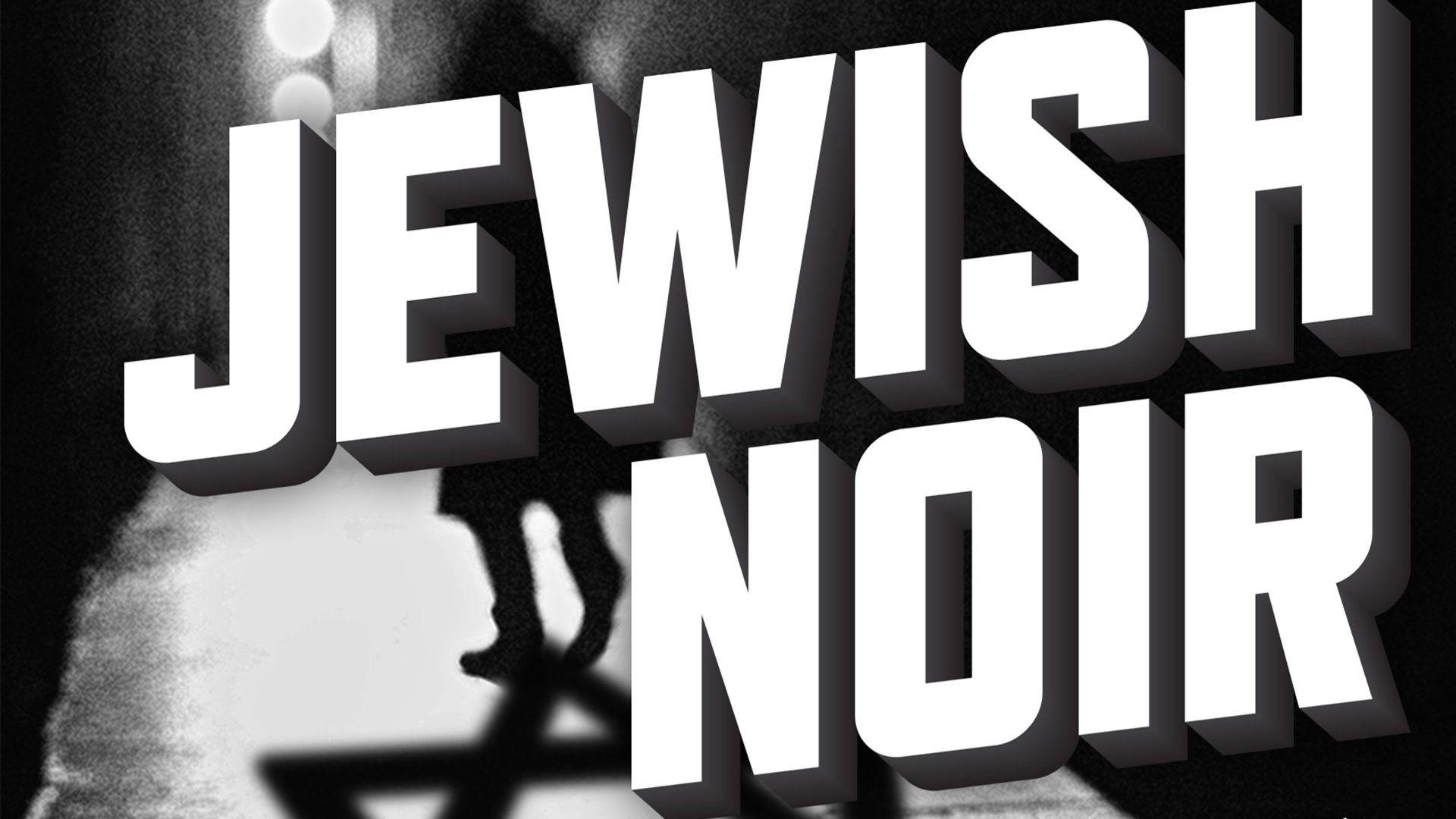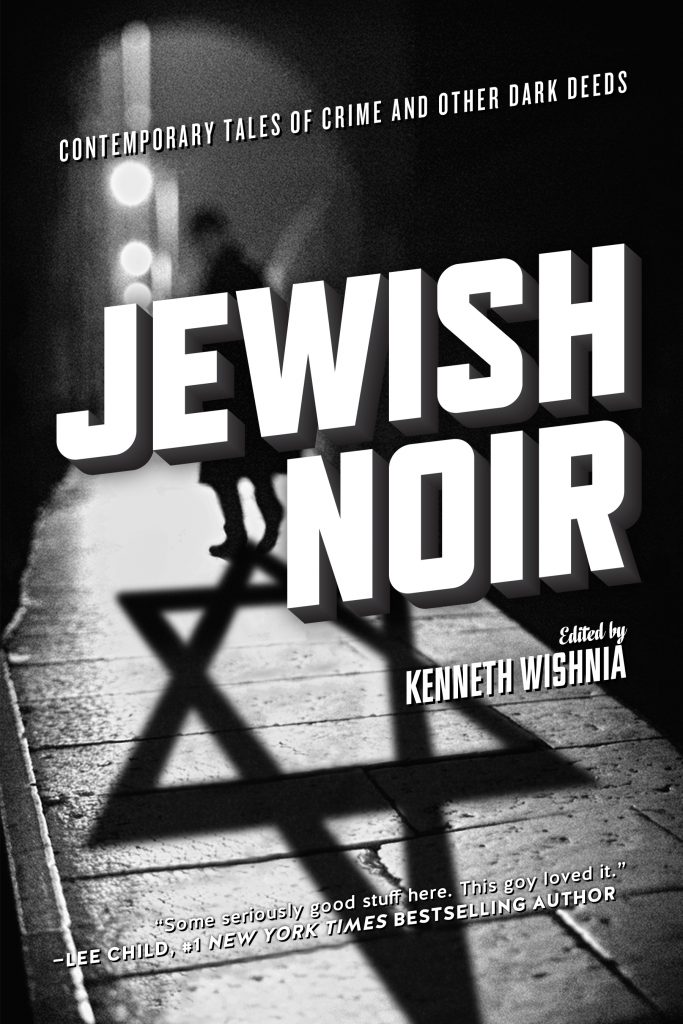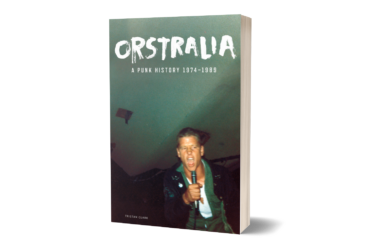RichardGodwin.net
June 10th, 2015
Kenneth Wishnia is the author of numerous highly acclaimed novels, among them 23 Shades of Black. His work is imbued with the hybrid knowledge of Noir. An articulate narrator, he is at once both ancient and modern. Kenneth met me at The Slaughterhouse, where we talked about identity and his fictions.
To what extent is identity important in your fictions?
Identity is tremendously important in my work. My protagonists are almost always marginalized outsiders, members of ethnic and/or religious minorities, or hanging by a thread economically. Some of this likely stems from the ancient tribal prophetic drive to “give voice to the voiceless,” a tradition going back to one of the earliest people’s prophet, Amos, an 8th century BCE “sheepbreeder from Tekoa” who is called upon by God to take on those “who defraud the poor, who rob the needy” (4:1).
Some of it is a reaction against a certain kind of contemporary “thriller” protagonist. You know the type—she or he is always a junior partner in some high-powered law firm who’s desperately trying to make senior partner; an intrepid investigative journalist or police detective whose job is in jeopardy; or a mid-level military or special agent, something like that. I think the idea behind such protagonists is that middle class readers will identify with them more than with a working class protagonist, especially since, in U.S. culture anyway, such professionals are seen as having more at stake, as having something to lose. As if working people don’t risk losing everything they’ve got if they dare to step out of line or miss a day of work.
In fact, I’ve found that once people reach a certain level of professional and economic stability, they are often far less likely to rock the boat, while those who have a much smaller stake in the economic system are often the ones who are willing to risk their livelihoods to take on the big bad guys.
Do you think there is a sub-genre of Noir that may be identified as the Noir of alienation, particularly when applied to the Jewish experience?
The theme of Jewish alienation goes back at least as far as the patriarchal era of the Middle Bronze Age (circa 1900 BCE) when God tells Abraham to leave his home city of Ur in southern Mesopotamia, with the warning: “Know well that your offspring shall be strangers in a land not theirs” (Genesis 15:13). Even the word Hebrews conveys our wandering nomadic origins: the root letters of this ancient tribal name, e-b-r, can be found in the words ebra and ever, which mean cross over and other side, respectively. In other words, the Hebrews have been transgressive border crossers since way back.
This legacy has bred prejudices and superstitions that have followed us into the modern era:
Think of all those absurd conspiracy theories about the Jewish plot to take over global media and finances, which along with other hate-filled stereotypes contributed to the deadly assaults on the Holocaust Museum in Washington, DC (where the victim was an African-American security guard) and the recent attacks on Jews, police and representatives of free speech in Paris and Denmark.
That’s some pretty dark stuff.
It’s no accident that so many of the directors and screenwriters who explored the dark side of the American experience in the classic films noir of the 1940s-50s (many of whom were blacklisted as a result) were Jewish émigrés from Fascist Europe. But many of them were the U.S.-born children of immigrants, whose experiences clearly parallel those of the contributors to Jewish Noir, the anthology I am currently editing for PM Press (pub date: Oct. 1, 2015), who have endured more subtle forms of discrimination, exclusion, identity and/or uniquely Jewish moral crises.
I’ll close with a (generalized, oversimplified) statement about the (simplistic, triumphalist) Christian view of the world–e.g., the Hebrew God is distant and terrifying, while Jesus loves you–and especially the idea that, for Christians, if you follow the right path, everything will turn out great for you, whereas in Judaism, you can follow the right path and still get fucked (cf. Job). THAT’S noir.
How do you convey this in your novel 23 Shades of Black?
It’s central to the main character’s experience. The novel takes place in New York City in the early 1980s, when my character, Ecuadorian-American female detective Filomena Buscarsela, would have been one of the first Latinas on the NYPD. So not only is she a woman in a man’s world, she’s a woman of color in a white man’s world. And they put her through hell for it, which makes it very difficult for her to live up to the ideals she has set for herself.
She’s also something of an outcast
within her own “community” as well: immigrants from Ecuador were still a
very small group at the time, and she’s also a cop, so she is not fully
accepted by the Latino community, either, which makes her a minority
within a minority. (This phrase also describes the protagonist of my
Jewish-themed historical novel, The Fifth Servant, and my current
novel-in-progress, so it’s clearly a motif that I revisit again and
again.)
So she’s alienated from her job, her community, and from
American society in a general way as well. I guess that covers
everything. So what’s left?
One idea I was working with while writing 23 Shades of Black was to invert a cherished Hollywood type: the righteous individual who, through sheer grit and determination, kicks open the doors to his or her group’s participation in some wider aspect of the culture that had previously been closed off. Baseball legend Jackie Robinson, who played for the Brooklyn Dodgers, is a perfect example of this type of individual, single-handedly breaking the color barrier in Major League Baseball, and his place in baseball history is unassailable.
Hollywood just loves that kind of story.
But what if he had failed? What if the taunts finally got to him? Or, perhaps worse, what if he simply hadn’t been a very good baseball player? What might that have been like?
Rather than write about an untarnished superwoman who takes on all comers, beats the odds, and ends up triumphant, I wanted to explore the human reality of someone who simply can’t take the weight of the entire world on her shoulders, who shows incredible personal strength—but it isn’t enough. (I guess my Marxist upbringing is showing: collective action is the only way to go, people!)
That’s my idea of drama. And yes, when a righteous person tries their best and still ends up getting chewed up by the system, you’re in the realm of noir.
What event has changed your life?
That’s easy: Getting nominated for the Edgar Allan Poe Award for Best First Novel for 23 Shades of Black. I went from a nobody to a somebody overnight. I went from pressing my face up against the glass looking through the bulletproof glass window at the party to being inside at the party. The only thing that could top that would be getting a call from Hollywood. (Hello, Hollywood. Hello? Hello? Anybody there…?)
How important is legacy to you as a Jewish man living in America?
I’ve certainly never been interested in writing something trendy that will sell tons of copies in a single season but will disappear and be forgotten within a few years. Books are supposed to have a longer shelf life than a carton of milk, after all. My goal has always been to write something that will still be readable—and still be read—in a hundred years (at the very least).
One example: A couple of years ago, I read the Ace Books paperback edition of Harlan Ellison’s MEMOS FROM PURGATORY, about his experiences going undercover and joining a street gang in Brooklyn’s Red Hook neighborhood in the mid-1950s. First published in 1961, it was 50 years old when I picked it up—and Ellison’s voice was as engaging as anything written today. In terms of emotional realism, it didn’t feel dated at all. I even wrote to Harlan Ellison to tell him my reaction, saying that this book was still fresh after 50 years, which meant that it would still be fresh after 100 years. (And so on, until the language changes so much they’ll need footnotes to understand the references.) That’s definitely taking the long view, but really, what writer doesn’t fantasize—even a little bit—about still being read centuries later?
I think this attitude has less to do with my Jewish roots than my general goals as an artist, but perhaps the fact that Judaism is a text-based culture with a written legacy dating back thousands of years could have something to do with it.
Graham Greene wrote, ‘There is a splinter of ice in the heart of a writer.’ What do you make of his observation?
Any artist, good or great, has to be a bit driven.
One thing that distinguishes writing from many other professions is the requirement for a certain level of analytical and observational distance—the separation that comes with the need to step outside a situation to observe or record it, while others seem to be able to live in the moment with no need to preserve something of the event (except as a digital photo) in order to use it as material for creative development, expansion, or significant alteration. We are the ones who look past the glitz in order to spot the staples holding up the chintzy curtains that seem to dazzle so many regular folks. This spoils some of the fun, of course. But we’re also less likely to be taken in by scams, especially if they involve written documents or email communication. I suppose we’re a bit like lawyers in that regard, trained to spot the inherent weaknesses and contradictions of a given text.
I think ALL writers have a bit of that “It’s great meeting you, but could you all please leave me the hell alone so I can go home and write?” going on. I know I do. The average shmuck thinks that being a writer means that they pay you millions of dollars, the book writes itself, and you spend the rest of the day drinking in a bar surrounded by admirers. They have no clue that it’s damn hard work and it takes a long time to get something to come out right. And when you’re working on something you end up resenting interruptions—dentist appointments, wedding receptions, phone calls from anyone who isn’t offering you paid work—and I think that a lot of people can’t relate to the fact that one has to cultivate a level of indifference to many distractions that seem to enthrall other people.
You also need to be ruthless when you edit, and many people cannot manage this level of rethinking about any type of problem, much less one that calls for serious self-analysis and criticism.
And of course, the best stories never end with an unequivocal triumph. There’s always a “Yeah, but…”
What do you make of the e-book revolution?
E-books are both good and bad for authors. They’re good for two principal reasons: easy access and no returns. I was once on a panel at Left Coast Crime, and after the panel an audience member came up to me and said, “Your book sounded really interesting, so I just bought it.”
She held up her smart phone and showed me that she had just purchased the e-book version of my novel The Fifth Servant. What’s not to like about that? Also, in terms of plain dollars and cents (or pounds and pence if you prefer), ask any author about their royalty statements, and they will usually complain about the large amounts kept in reserve against returns, or the large number of returns of physical books that this system allows. No one returns e-books. That sale is final.
On the down side, e-books can divert a lot of traffic away from independent bookstores, which are often our biggest supporters, so that’s not so good for us.
What are you working on at the moment?
As I mentioned earlier, I’m editing an anthology of all-new stories for PM Press called Jewish Noir,
which is launching on Oct. 1 at the Mysterious Bookshop in New York
City, followed by events in Los Angeles, San Francisco, Boston, and
elsewhere. Anyone in the UK care to invite us all over for an event? The
roster of contributors includes Marge Piercy, S.J. Rozan, Eddie Muller,
David Liss, Charles Ardai, Gary Phillips, Heywood Gould, Jason Starr,
and many more. For more info, go to: http://secure.pmpress.org/index.php?l=product_detail&p=733
I’m
also working on an extremely ambitious Jewish-themed historical novel
with parallel storylines set in the modern era and the 6th century BCE. I
had to do a TON of research for this one, since I’m taking on the
biblical era–and believe it or not, one or two people have written about
the Bible before me, so I’d better know what I’m talking about. In any
case, my take on the subject is sure to outrage all kinds of people. Ha
ha ha.
What advice would you give to yourself as a younger man? Spend a lot more time and money on publicity and promotion. (A lamentable state of affairs, but that’s how it is, folks.) Oh, and don’t forget to write The DaVinci Code.
What do you find to be effective methods of promoting your work and do you think publishing is in crisis?
Argh. I fucking hate the fact that we’re supposed to spend thousands of hours promoting ourselves. When the fuck am I supposed to do the actual writing? I have a full-time day job, an autistic son, and I’m supposed to write a piece for the Huffington Post for free? KRAK!
WANGGG! I did a piece for AlterNet last year called “Five Reasons Why Committed Activists Should Read Crime Fiction.” It’s a nice little piece and I’m reasonably proud of it, but it took me eight hours to do the work and I didn’t get paid one cent for it. GDDZZZZT! SISSS! BOOOM!
The people who set up and run the site don’t do it for free, but I’m supposed to put in eight hours of unpaid labor for them? KSSSHHHH! For the exposure, they say. I’m too old for that crap. When I was in my 20s, I routinely put in seventy-hour weeks for no money just to get experience. BADABOOM! STOMP! KSSHH! Even when I was in my 30s, and married with two children, I spent six months translating a novel from Spanish in order to get the experience, get a line on my resume, and maybe, just maybe, get some karma points for helping out a fellow author. I got $500 for six months’ work, so I sure didn’t do it for the money. YANNNGGGGG!
WEEEE-OOOO-EEEE-EEE! I also taught a bunch of college courses for no money at all while I was in graduate school just to get the experience that led to my full-time teaching job. But that was twenty years ago, and I’m sick of this new dynamic. KLANNGG! ANNGGG! ANNGGGG! All the big places have the money to pay for office space, electricity, equipment, and of course, administration costs. So fuck them. Pay me for my work, assholes. ZINNGGG! ANNNGGGG!
WEEEEEEEE!
And if you want to read my work for free, go get one of my books out of
the library. KSSSHHHH! BOOOM! KRNCHH! KRKRNCH!
WEEEEEEEEEEEEEEEEE-OOOOOOOOOOOOOO-EEEEEEEEEEEEEEEEEEEEE!
KONNNNNNNnnnnnnnggggggggggggggggg….
Guess I should mention that I’m currently reading Pete Townshend’s autobiography, Who I Am.
Does it show?
Thank you Kenneth for a great interview.







